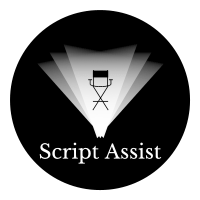Script Assist is run by Brandon Potter and Shannon Soccocio, both graduates of SUNY Oswego. Brandon graduated with a degree in Cinema and Screen Studies, and Shannon with a degree in Creative Writing. In their time as screenwriters, they have collaborated on multiple short and feature films, won Best Screenplay for a short film in 2018, worked as Teaching Assistants for screenwriting classes educating students on formatting, film production, and storytelling, taken multiple screenwriting classes for film and television, and worked as analysts for a confidential screenwriting competition in Los Angeles. Both have a passion for writing and helping others.
Established in July 2020, Script Assist is a screenplay feedback and editing business based off of Facebook. We provide our clients with 5 pages of quality feedback on their story, full edits on formatting and grammar, a phone call before and after receiving feedback, and are now looking to add screenwriting classes to assist beginning screenwriters with their work. As analysts, Brandon and Shannon learned what most contests look for in screenplays. With that knowledge, the purpose of creating Script Assist was to help other screenwriters perfect their screenplay by offering feedback on their story and making sure their formatting and grammar is correct.
What was the last thing you read or watched you considered exceptionally well-written?
The Haunting of Hill House on Netflix, created by Mike Flanagan. If you’ve seen it, it’s not hard to guess why. On top of the remarkably well-written characters, the unique use of time jumps and callbacks to past episodes make this a show worth watching. The impeccable pacing, the underlying themes, and the powerful emotional investment make it a show that after you watch it, it’s all you think about for hours. Plus, searching for the hidden ghosts is always fun.
Their second season, The Haunting of Bly Manor, was also written really well, but unfortunately, didn’t stand up to our expectations after watching the first season. The timeline was a bit confusing and it felt very unorganized.
How’d you get your start in the industry?
We were both attending SUNY-Oswego, and taken screenwriting classes with professor Juliet Giglio. She noticed we really understood the basics of screenwriting and how to do it well, and asked us to be teaching assistants. From there, we became analysts for a confidential screenplay competition. We both learned a lot about editing and what screenplay competitions look for. From there, we started Script Assist to help others with their screenplays.
Is recognizing good writing something you think can be taught or learned?
Yes! Something a lot of people don’t realize is that there’s a lot that goes into a script. You need to have not only a good story, but one that’s well thought out. You also need proper formatting, and to make sure your story can relate to your audience and yourself . Without knowing what to look for, it’s not easy to know if something is actually written well.
What do you consider the components of a good script?
Many writers believe that a good script should include well thought out characters and a good story. This is obviously true, but you also need to think about emotional investment. Emotional investment is extremely important when it comes to creating a good script. You need characters your audience can relate to. You want your audience to have somewhat of a relationship with your characters so they feel for them.
Pacing is also very important in writing a good script. Bad pacing is extremely noticeable in a screenplay and will quickly lose the audience’s attention. You need to know when each event should be taking place, such as the inciting incident and the midpoint. Without knowing this, your script will feel off; either too slow or way too fast. Last, but certainly not least, your script should definitely have an intriguing hook to capture the audience’s attention from the start.
What are some of the most common screenwriting mistakes you see?
Screenwriting is a fairly easy thing to learn if you read some books and look over professional scripts. But there are a lot of beginning screenwriters that tend to make the simplest mistakes. Some common mistakes we see a lot are long action blocks. Writers must realize they’re not writing a novel; it’s a script for a movie or TV show. Judges in competitions and producers like to see a lot of white on the page. This means that you should have an even distribution of words and blank space. Action blocks should only ever be between 3 to 4 lines.
Another huge mistake we see often are “How Do We Know” moments, or “HDWK”. This is when the writer has written something in an action block that the reader and audience is not able to see, therefore would never know. Writers must make sure they’re only writing things that can actually be seen on screen. “Sally feels sad” would be an example of a HDWK moment. There is no way for the audience to know that unless you show it. So instead, the writer could say, “Sally frowns”.
What story tropes are you just tired of seeing?
We don’t feel there are any we’re totally tired of seeing. Everyone can put their own twist on things and make them feel new and enjoyable to read. Even if it’s the same trope, the writer can do a million different things to make it unique.
What are some key rules/guidelines every writer should know?
Action blocks should only be 3-4 lines
Always watch out for “naked sluglines” – when a scene heading is directly followed by anything other than an action block
Make sure you have good character descriptions
Formatting and grammar need to be near perfect
Don’t have any HDWK moments
Scripts can’t be written overnight. Be patient.
Be open to all feedback and suggestions
Have you ever read a script where you thought “This writer gets it”? If so, what were the reasons and why?
Definitely! These writers know how to format, give proper descriptions so that the reader can easily visualize what is happening, and how to write an engaging story. It’s obvious to us that the writers who stand out have taken their time with their story and have learned from their own experience.
How do you feel about screenwriting contests? Worth it or not?
Contests can definitely be beneficial for all writers, but if you’re thinking of entering your screenplay into any contests, make sure you do your research to ensure it’s the type of contest you’re looking for. Many writers rush to get their screenplays out into the world, yet don’t look over all their options. Smaller contests can be just as beneficial as the bigger ones, as each contest gives the writer experience. Winning any contest can open many doors. We definitely recommend checking out some of the different competitions for screenplays.
Very important – always proofread your work prior to sending it in! Make sure it’s ready to go before you pay that registration fee.
How can people find out more about you and the services you provide?
People can check out our website at www.scriptassists.com, or visit our Facebook page at https://www.facebook.com/scriptassists/.
Readers of this blog are more than familiar with my love/appreciation of pie. What’s your favorite kind?
Brandon – not a fan.
Shannon – I love a good chocolate cream or cherry.




